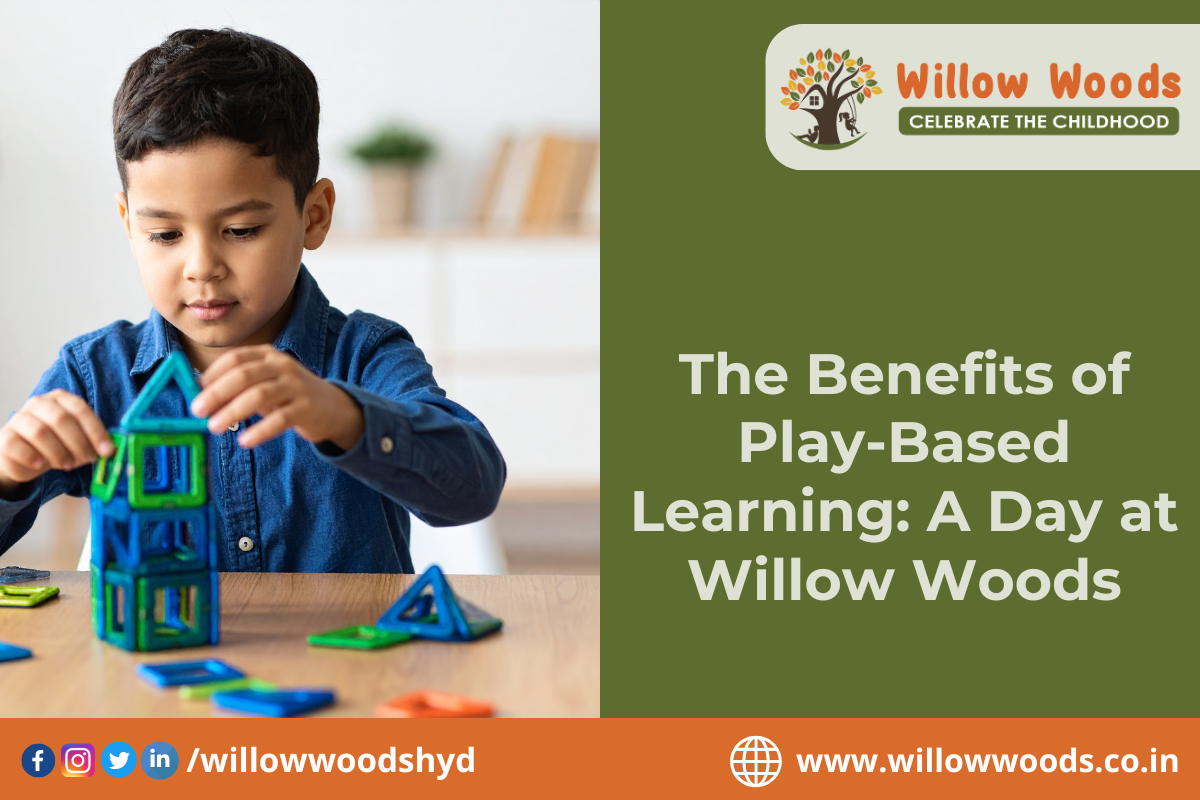Have you ever watched children on a playground? One moment they’re best friends, the next they’re arguing over a toy. Then suddenly, they’re laughing together again like nothing happened. That little roller coaster is social development in action. During the preschool years, children begin learning how to share, cooperate, listen, and express themselves. These abilities
Introduction
Do you remember your happiest childhood moments? Chances are, they involved play. Whether it was building blocks, singing rhymes, or chasing friends in the park, play wasn’t just fun—it was learning in disguise. At Willow Woods Pre School, we believe that play is the heart of early education. It’s how children discover the world, understand relationships, and build skills that last a lifetime.
Let’s take you through a day at Willow Woods to show how play-based learning creates confident, curious, and joyful learners.
Table of Contents
| Sr# | Headings |
| 1 | What is Play-Based Learning? |
| 2 | Why Play Matters in Early Childhood |
| 3 | Cognitive Development through Play |
| 4 | Emotional Growth: Play as an Outlet |
| 5 | Social Skills and Teamwork |
| 6 | Physical Development and Active Play |
| 7 | A Morning at Willow Woods: Circle Time & Free Play |
| 8 | Creative Play: Arts, Crafts, and Storytelling |
| 9 | Outdoor Play and Nature Exploration |
| 10 | Structured Play: Games with Purpose |
| 11 | Language Skills through Rhymes and Role-Play |
| 12 | Building Imagination with Pretend Play |
| 13 | Play and Problem-Solving Skills |
| 14 | Teacher’s Role in Guided Play |
| 15 | Why Willow Woods is the Best Pre School in Hyderabad |
| 16 | Conclusion |
| 17 | FAQs |
1. What is Play-Based Learning?
Play-based learning is an educational approach where children learn through meaningful play. Unlike rote memorization, this method engages their curiosity, creativity, and critical thinking. Play isn’t separate from learning—it is learning.
2. Why Play Matters in Early Childhood
For young children, play is as important as food and sleep. It builds connections in the brain, shapes personality, and provides the foundation for lifelong learning.
3. Cognitive Development through Play
Puzzles, building blocks, and memory games stimulate problem-solving and critical thinking. These activities enhance concentration, memory, and logical reasoning.
4. Emotional Growth: Play as an Outlet
Play allows children to express their feelings. Pretend play helps them act out emotions, while group games teach patience, empathy, and handling disappointment.
5. Social Skills and Teamwork
Sharing toys, taking turns, and cooperating in group play strengthen communication skills and build friendships. These early social interactions create confident future leaders.
6. Physical Development and Active Play
Running, jumping, and climbing improve motor skills, coordination, and stamina. Active play also builds lifelong habits for a healthy lifestyle.
7. A Morning at Willow Woods: Circle Time & Free Play
Every day begins with circle time, where children sing songs, share stories, and greet friends. Free play follows, giving them the freedom to choose activities that spark their interests.
8. Creative Play: Arts, Crafts, and Storytelling
Painting, clay modeling, and storytelling sessions stimulate imagination. These activities also improve fine motor skills and self-expression.
9. Outdoor Play and Nature Exploration
Our outdoor sessions encourage children to observe butterflies, water plants, and explore nature. These experiences create curiosity about the environment.
10. Structured Play: Games with Purpose
Games like “Simon Says” or number-based treasure hunts build listening skills, counting ability, and memory—all while having fun.
11. Language Skills through Rhymes and Role-Play
Singing nursery rhymes, enacting stories, and role-playing enhance vocabulary and language fluency. Children learn to express themselves confidently.
12. Building Imagination with Pretend Play
Whether they’re doctors, shopkeepers, or superheroes, pretend play allows children to explore roles and responsibilities in a safe environment.
13. Play and Problem-Solving Skills
Through building towers or solving puzzles, children learn trial-and-error methods, resilience, and the joy of achievement.
14. Teacher’s Role in Guided Play
Teachers at Willow Woods act as facilitators, guiding play in ways that ensure learning outcomes. They create opportunities for both structured and free play.
15. Why Willow Woods is the Best Pre School in Hyderabad
At Willow Woods, play-based learning is at the heart of our curriculum. We blend academics with fun, ensuring overall development—physical, mental, emotional, and social. Our nurturing environment, dedicated teachers, and engaging activities make us stand out as the Best Pre School in Hyderabad.
16. Conclusion
Play isn’t just a pastime—it’s the foundation of education. At Willow Woods Pre School, every block stacked, song sung, and story told is a step toward building brighter futures. When children play, they don’t just laugh and run—they grow, learn, and thrive.
FAQs
1. What is the biggest benefit of play-based learning?
It makes learning fun while developing cognitive, emotional, and social skills.
2. How does play prepare children for school?
Play teaches discipline, problem-solving, and teamwork—skills essential for formal education.
3. Can play replace academics?
Not replace, but enhance. Play makes academics easier to grasp by connecting concepts with real experiences.
4. What role do teachers play in play-based learning?
Teachers guide and structure play activities so children learn while enjoying themselves.
5. Why choose Willow Woods for play-based learning?
Because we combine structured learning with joyful play, ensuring holistic development.
About Willow Woods Pre School
Willow Woods Pre School is among the Best Pre Schools in Hyderabad, located in Miyapur and Mayuri Nagar. We specialize in preparing children for formal schooling by nurturing their social, emotional, physical, and cognitive skills. Through a balance of structured activities, storytelling, and free play, Willow Woods ensures children learn joyfully in a secure, engaging environment.
📞 Contact Information
- Bachupally: 9981 9981 27
- Mayuri Nagar: 9398 4486 77
- Email: info@willowwoods.co.in
- Website: www.willowwoods.co.in
✨ Admissions Open 2025–26 ✨

